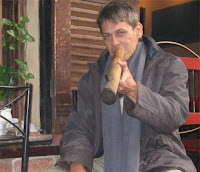 VietNamNet Bridge – Madeja Markus, the founder and owner of the famous Son Tinh alcohol brand in Hanoi is a special man. As an ethnology student, Markus came to and decided to live in Vietnam.
VietNamNet Bridge – Madeja Markus, the founder and owner of the famous Son Tinh alcohol brand in Hanoi is a special man. As an ethnology student, Markus came to and decided to live in Vietnam.
A new land
This Swede has taken a Vietnamese name, Son, which means mountain. Studying ethnology, Markus’ hobbies are traveling and discovering new places. He came to Vietnam in 1993 as a tourist on a trans-Vietnam tour. He spent three months in the coastal city of Nha Trang in the central province of Khanh Hoa, three months in HCM City, and many days in the Northwestern region.
After his first journey to Vietnam, he decided to return and learn more about this country. Markus worked several jobs to support himself: a tour guide for European travelers, an advisor for hunger eradication, poverty alleviation and environmental protection projects conducted by various international organizations, etc.
Agricultural diversity
During his travels through this land, Markus saw discovered it is rich with agricultural, but local farmers didn’t know how to efficiently and effectively use their products. He met a family who had a large mango garden and could not sell all of their fruit, even at extremely low prices VND500/kg ($0.03). They let their mangos ripen and fall. They didn’t know to process them into dried mangos or mango juice. He wanted to help Vietnamese farmers.
Growing up in a region that grows many kinds of fruit, Markus is experienced at processing fruit. Farmers in his hometown often sell some of their crop as fresh fruit and process the rest into wine or juice. Markus decided to produce wine from Vietnamese fruit, with the assistance of a wine producer.
Local wine
Markus bought special fruits of the Northern region like tao meo, apricot, plum, citron, etc. and carried them to Hanoi to produce wine. He had to try several times before he mad a successful batch.
Now he produces three kinds, all named Son Tinh (Mountain Genie), including fruit wine, herb wine and rice wine.
Markus is proud that his wine is produced by the traditional methods of Switzerland and Vietnam and doesn’t have any additives. He learnt wine processing methods from farmers of Phu Loc village in the Northern city of Hai Duong.
Markus hopes that Son Tinh will become a unique gift for foreign visitors. Admitting that he too is ambitious, Markus says wine is a popular gift and so there is opportunity.
Ruou can (wine drunk out of a jar through pipes) is an ethnic specialty but is difficult to transport or keep fresh, so he wants to produce a special Vietnamese wine, comparable to Japan’s Sake.
In mid-2006, Markus put his 4,200sq.m wine factory into operation in Gia Lam Industrial Zone in the suburbs of Hanoi. This factory can produce several thousand liters of wine per year, far less than demand. This year Markus will expand his factory to reach a yearly output of 50,000 liters.
He is pursuing a plan to set up material areas, which can supply fruits and herbs to his operation.
